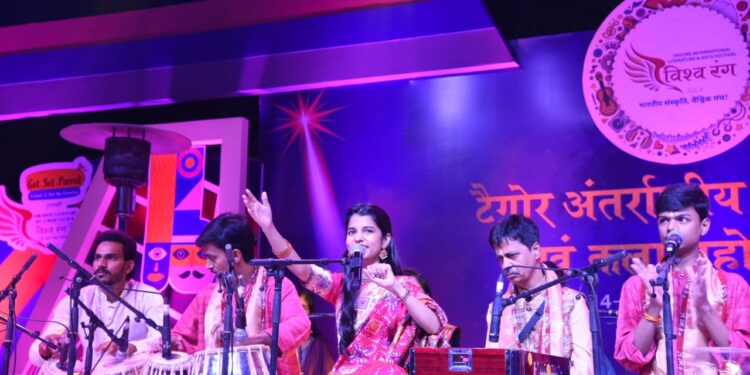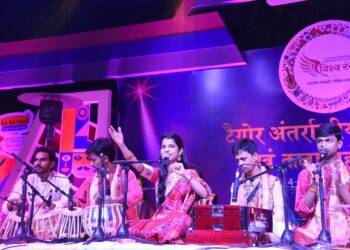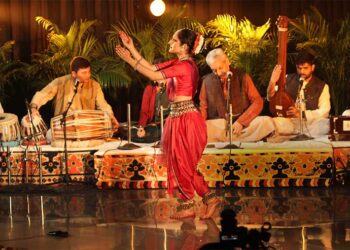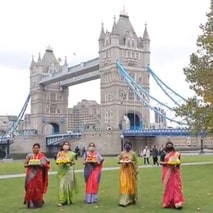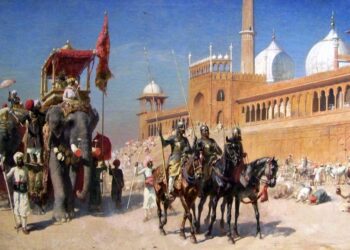The fourth edition of the Vishwarang Festival left lasting memories of a unique cultural carnival held on a monumental scale in the heart of India
BY VISHAL DUGGAL
As I soaked in the myriad shades and colours of literature, arts, dance, music and cinema splashed across the picturesque city of Bhopal, Madhya Pradesh, with gay abandon, Vishwarang left me spellbound and speechless with its creative grandeur. A global forum of Indian culture, Vishwarang 2022, organised by Rabindranath Tagore University (RNTU), presented an enchanting world of finer pursuits, thronged by a galaxy of dignitaries, thought leaders, and eminent personalities from across the globe, celebrating the multi-coloured spectrum of human life through various mediums of expression.
The festival began with a grand event of Vishwarang Kala Mahotsav (November 14-16) held at RNTU and Rabindra Bhawan, Bhopal. It saw an Artists Walk For World Peace & Harmony, followed by a national painting exhibition, film screening and discussion sessions on tribal and folk culture. The evening was overtaken by the magic of acclaimed vocalist Kaushiki Chakraborty’s classical rendition that took the audience to a sublime level. Other key highlights included unforgettable performances like dance-drama Shri Ram by Shriram Bharatiya Kala Kendra, the play Bandish directed by well-known theatre director Poorva Naresh, and Rabindra Sangeet by Shubbrata Sen and Vrindgaan by Sur Parag Jabalpur.
Subsequently, from November 17 to 20, the Tagore International Literature and Arts Festival (TILAF) was held. A Sadbhavana Rally from Rabindra Bhavan to Khushabhau Thakre International Convention Centre (Minto Hall) with the participation of many art lovers, artists and litterateurs marked the commencement of TILAF where various sessions on literature, arts and culture were held. Apart from ecstatic performances by acclaimed artistes such as Papon, Shilpa Rao and Maithili Thakur, the highlights included events like Meet the Author, exhibitions on paintings and Indian Sage Scientists, Stone Art, Dhrupad music, poetry and story sessions, discussions on various topics like global impact of Indian culture, Indian knowledge system, National Education Policy, and entrepreneurship. The festival also hosted an International Kavi Sammelan and Mushaira, in which poets such as Alok Shrivastav, Azhar Iqbal and Shinkaf Nizam participated. Poets Francis Combes (France), Sheetanshu Yashashchandra, Shahnaz Munni (Bangladesh), Sukrita Paul, and Jayant Parmar discussed world poetry and recited their compositions, while Santosh Choubey, director of Vishwarang, presided over the Second World Poetry Session.
Keeping in mind the importance of the tribal community, Vishwarang also organised a special Tribal Literature and Arts Festival, under which programmes related to tribal art, dance, painting, and literature were held.
The Vishwarang Festival witnessed keen participation from 50 other countries such as Germany, US, UK, UAE, Ireland, China, Singapore, Canada, and the Netherlands. Various authors participated in the discussions encompassing diaspora literature, Hindi and Urdu poetry, the art of painting and illustration, women’s writing and the role of regional language literature.
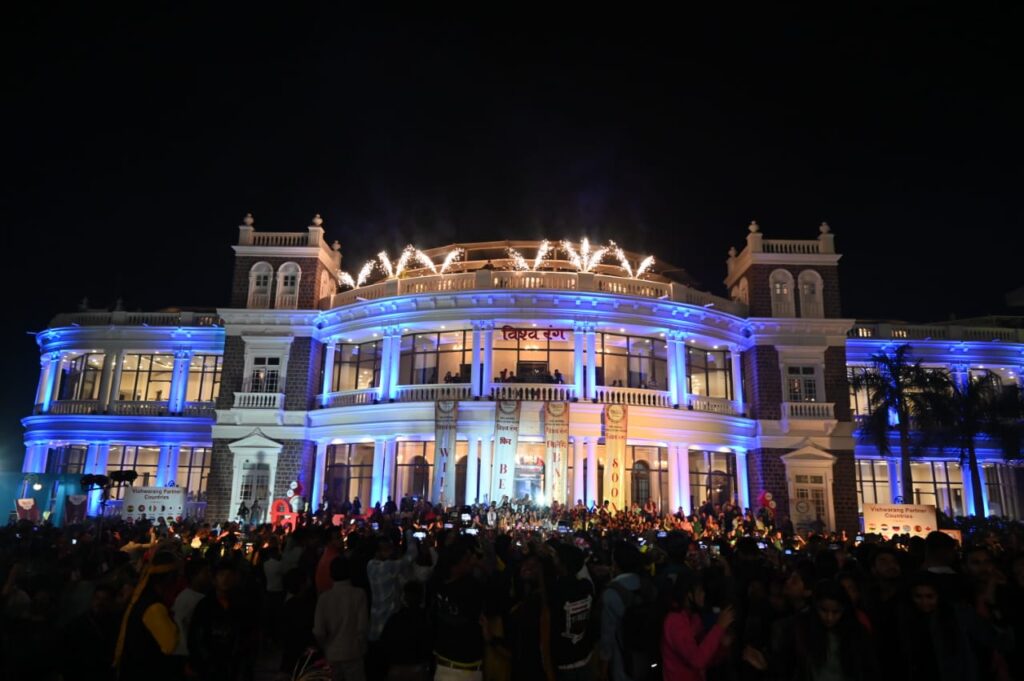
Celebrities from diverse fields interacted with the audience and enriched this International Literature and Arts Festival. They included filmmaker Vishal Bhardwaj, actors Manoj Pahwa and Rasika Dugal, known for their roles in several Indian movies and television shows; creative director of popular online YouTube channel The Viral Fever (TVF) Biswapati Sarkar, scientist K. Kasturirangan, Shark Tank-fame co-founder and former MD of BharatPe Ashneer Grover, playwright and poet Nand Kishore Acharya, president of the Indian Council for Cultural Relations Vinay Prabhakar Sahasrabuddhe, Indian diplomat and author Pavan K. Varma, Padma Bhushan awardee Pratibha Rai (author of novel Yajnaseni: The Story Of Draupadi), and writer Naveen Choudhary. Other notable names included National Organising Secretary of Bharatiya Shikshan Mandal Mukul Kanitkar, renowned art critic and poet Prayag Shukla, film and art critic Vinod Bhardwaj, film producer-director and critic Sudeep Sohni, well-known painter Ashok Bhowmik, former director general of All India Radio and Doordarshan Leeladhar Mandloi, reputed film and theatre critic and senior print and TV journalist Ravindra Tripathi, and art critic Vinay Upadhyay.
The luminaries from the political life who participated in the festival included the Governor of Madhya Pradesh, Mangubhai Patel; the Governor of Chhattisgarh, Dr Anusuiya Uikey; the minister of culture (Madhya Pradesh), Usha Thakur; the minister for public health and welfare, M.P. Prabhuram Chaudhary; and the minister for MSME & Science & Technology, Om Prakash Sakhlecha.
The Vishwarang Festival encompassed another added attraction: the Get Set Parent Children’s Art, Music & Literature Festival. The three days of the fun-filled on-ground extravaganza from November 18 to 20 saw world-class shows such as storytelling, author interactions, theatre workshops, clowning and different art workshops on calligraphy, pottery, mandala, origami, doodling, and dance and music concerts by renowned artistes and professionals.
Elaborating on the significance of Vishwarang 2022, Santosh Choubey said, “The success of the fourth edition has reinforced our belief that celebration of arts and culture transcends man-made barriers. What made this year even more precious is the letter we received from the Prime Minister, Narendra Modi, appreciating and congratulating us for Vishwarang.”
The festival brought together people from foreign shores including members of the Indian diaspora in collective endeavours to strengthen the country’s centuries-old cultural traditions, apart from providing a global platform to Hindi and other Indian languages. Visibly elated at the successful conclusion of Vishwarang 2022, Choubey added, “Arts and culture play an extremely significant role in the development of any country and we are delighted to see the response towards the festival which aims to promote our country’s vast heritage. We are proud to see how Vishwarang has outgrown itself from 12 countries to now being celebrated in more than 50 countries. Apart from the huge response in Bhopal, Vishawarang reached more than two crore people through our digital platforms. We are excited to announce that the fifth edition of Vishwarang will be held on an even bigger scale.”
‘Vishwarang provides centrality to Indian languages, and Bharatiyata’
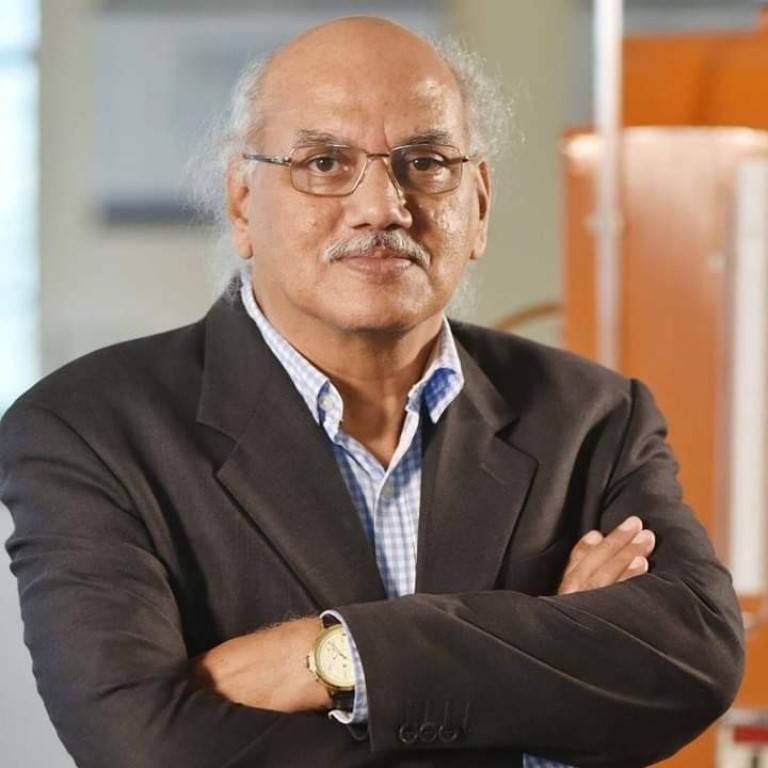
The director general of the Vishwarang Festival and chancellor of Rabindranath Tagore University (RNTU), Santosh Choubey is the brain behind the first-of-its-kind cultural festival in India that focuses on Indian languages, arts and literature.
Choubey is a renowned Indian social entrepreneur and educationist. In 1985, he founded the All India Society for Electronics and Computer Technology (AISECT), an organisation that has been playing a key role in bridging the IT literacy gap between urban and rural India. A multifaceted personality, he spoke to Vishal Duggal of Pravasi Indians during the festival in Bhopal. Excerpts from the interview:
Your views on Vishwarang and its changing trends year by year…
We have been working in Indian languages including Hindi for over 30 years. Actually, we started working in 1990. It went on in various ways such as giving awards, printing and publishing books and organising several small conferences. But, as Indian culture and languages require much bigger projection outside, we started Vishwarang Festival in 2019. Vishwarang provides centrality to Indian culture, and Bharatiyata. I’m sorry to say that generally there is a kind of elitism and lack of Indianness in other festivals which are completely dominated by publishers’ lobby.
Our differences are within the country but in the world people look at India for leadership in arts, culture and literature, and the eternal tradition of Indian languages that requires a bigger intervention. In 2019 about 12 countries came together when we invited them for the festival. Then Covid arrived and that actually proved our point that development directions had to change. In 2020, we had technology-based online modes such as YouTube and other social media channels and reached out to more than 1.5 crore people.
Now we are holding the festival in a blended mode—we are doing it in physical mode also and it’s being disseminated the world over through various media platforms. Doordarshan covered the inauguration and it was telecast to 110 countries. Our Facebook Live and YouTube channels are attracting a huge number of visitors.
We have now broadened our horizons from Indian languages to dialects, tribal culture, painting exhibitions, children and tribal community festivals. So that way it has become more multifarious. In terms of the number of countries, there are now 50 countries participating in the festival.
How much have you been able to provide an opportunity to the Indian diaspora to rediscover their roots?
I think, over the years, the Indian diaspora has also changed. In the time of, say, the British Raj, they went out to Mauritius, Surinam, Fiji or the West Indies as workers. But the new generation of NRIs is now holding important, responsible positions, becoming an equal partner in the growth of their adopted countries. In addition to nostalgia, there is also local participation and the joy of living in that country, which is now reflected in their literature.
The main problem with Pravasi literature is that they are not getting serious attention from mainstream literature and media. So they feel left out. What we did was to hold their hands, get their books reviewed and their books started talking. Even in this festival, there are several sessions on diaspora literature and they are discussing poetry, fiction, non-fiction and a lot more. There are many serious writers participating in the festival like Divya Mathur, Kusum Bedi, Tejendra Sharma, Hansadeep, and Rekha Rajvanshi.
I would say that we have touched the hearts of expat Indians and this year also a large number of NRIs are attending the festival.
Every year, do you have a particular theme for the festival?
Yes, the first year the festival theme was the internationalism of Tagore and Gandhi’s vision of development. It explored the view that a new path should emerge for development especially because the older theories and ideologies have not done any good to the world. The Fest’s 2020 and 2021 editions catered to literary communities starved of the arts in Covid-impacted years.
This year Vishwarang is being organised completely offline. The world is facing raging conflicts and geopolitical turmoil. So, our 2022 theme is love and compassion.
How is Vishwarang different from other cultural festivals in the country?
Vishwarang is different in many ways. It has no narrow ideological divisions. It is interdisciplinary with sessions on various genres—philosophy, literature, the arts, tribal culture, entrepreneurship, and many more.
Are you able to give Indian culture and languages a global platform through this festival?
Yes, apart from providing a global platform to Indian languages, Vishwarang also holds a mirror to the richness and diversity of Indian culture.
‘There is scope for adding many more countries to Vishwarang’
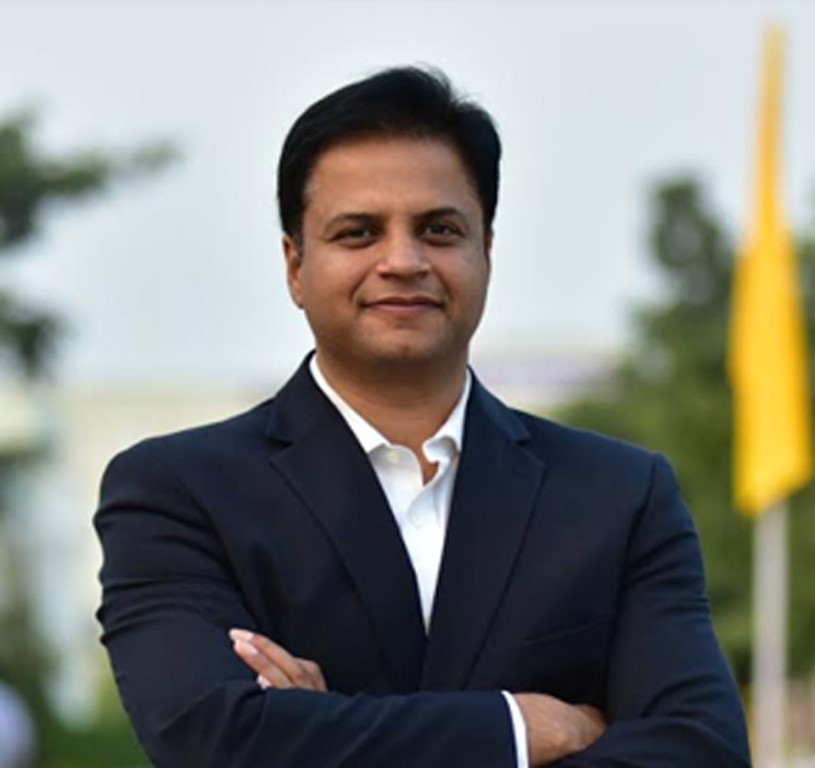
Siddharth Chaturvedi, co-director of the Vishwarang Festival, is also the director of the All India Society for Electronics and Computer Technology (AISECT) that has a mission to promote skill-based education and learning and make global quality education accessible and affordable to suburban and rural students. An MBA from S.P. Jain Institute of Management and Research, Mumbai and an engineering graduate from MANIT, Bhopal, he is taking forward the vision of his father to provide a global platform to Indian languages, literature and the arts and reach out to the remotest corners of the country to empower people. Young and ebullient, and bubbling wih untiring dynamism, Chaturvedi spoke to Pravasi Indians during the recently held Vishwarang 2022 festival in Bhopal. Excerpts from the interview:
How did the idea of Vishwarang come about?
AISECT is primarily a social entrepreneurship-driven organisation that works in various verticals of skills and higher education and financial inclusion for rural India, online learning and content development and so on. The group has established five private universities. RNTU is the oldest university established by us, it draws heavily from the AISECT experience of grassroots connect, that is, reaching out to different communities working in Hindi and regional languages. So, when the entire group and the university was thinking of promoting Indian culture, literature and various art forms, we thought of becoming partners with the existing festivals; we did actually support a lot of events as a university.
But we realised that the objective and thought process of our festival was quite different from theirs and we have to have our own way of expressing what we mean by a festival which is focused on Indian languages and art forms and that’s how the idea of Vishwarang came about. The first Vishwarang was more of an experiment and a learning ground in a pilot, but the learnings from there further cemented some of the other hypotheses or beliefs which we had. We had a clearer path of where Vishwarang was going, but still it was at a very nascent stage. I would not say that we have now fully discovered the true identity of the festival. But we are broadly sure of the main objectives and the contours of this entire festival.
How do you think you have been able to bring writers and artists from other countries to India and act as a bridge between the Indian diaspora and their country of origin?
I think in this particular objective, Vishwarang has been quite successful because even during the first year Vishwarang started by partnering 12 countries and we discovered that there is a lot of love for Indian culture, art, literature, and heritage amongst the Indian diaspora living in other countries. Some of the people we already were in touch with really liked the idea of having a common umbrella brand of a festival. And, during the first year, more than what we got in India, the response was stronger in those countries where the ambassadors were giving congratulatory messages for their participating communities. And, a blessing in disguise was that in 2020, when we did the festival virtually, we generated tremendous reach because of online meetings. And the intended message travelled to many countries and a lot of people who wanted to participate approached us through somebody or directly.
Now we have a strong network of around 50 countries. They have all done their country festivals before coming to Vishwarang: a two- or three-day festival involving the diaspora and some of the other Indologists who just have plain, simple appreciation or love for Indian arts. We see that this community can become more cohesive and there is scope for adding many more countries because the Indian diaspora is quite a force across the world.
But it is scattered, and you want to bring it to a unifying platform…
Yes. And we are the platform where this happens at regular intervals. In fact, we already have invitations from at least five countries to come and celebrate Vishwarang at least for two or three days in their countries. So, there is scope that the main festival will continue in Bhopal, but mini festivals will come up in other countries.


